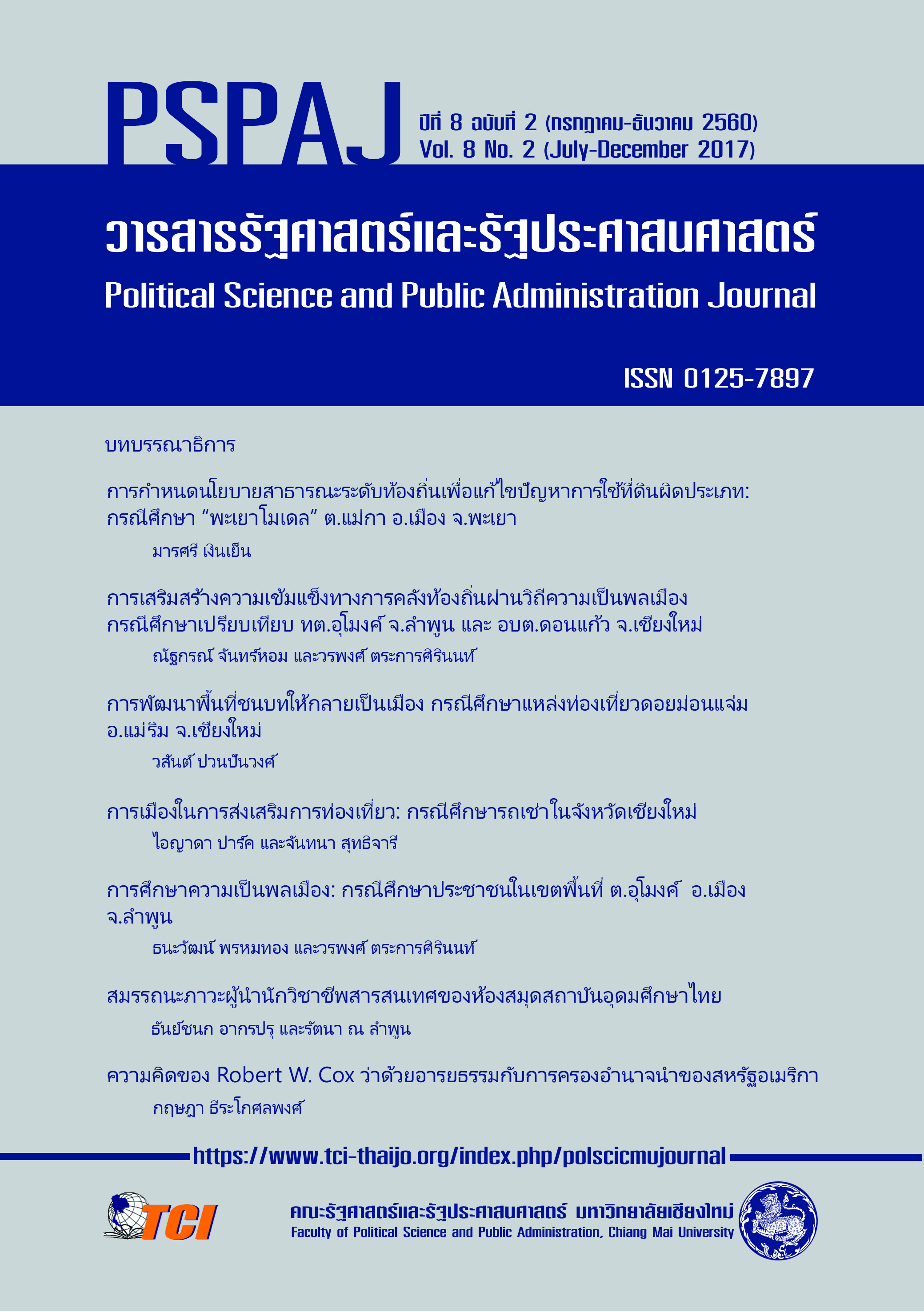The Study of Citizenship: Case Study of People in Umong Subdistrict, Mueang District, Lamphun Province
Main Article Content
Abstract
This article has two main objectives: (1) to study citizenship levels of the people residing in Umong Subdistrict, Mueang District, Lamphun Province, and (2) to study factors affecting the levels of citizenship of the people in Umong Subdistrict, Mueang District, Lamphun Province. This was a Mix Method research. The tools used in the study were questionnaires and focused group dialogs. The researcher collected data from the sample group of 400 people answering questionnaires and the focused group dialogs with three groups of people in Umong Subdistrict, Mueang District, Lamphun Province. The three groups included (1) community leaders, (2) general people, (3) members of the community learning resources. Data collected from both tools were about the levels of citizenship and about factors affecting citizenship of the people.
The results of the study revealed that the desirable attributes for citizenship found most in Umong Subdistrict could be arranged in order as follow: (1) moral shame and conscience, (2) honesty and integrity, (3) courage and confidence, (4) sharing ideas for tackling problems, (5) supporting and promoting a good person, (6) unity, (7) displaying concern for problems in local community, and (8) playing roles in solving problems. With regards to factors affecting the levels of citizenship, the research found that family, educational institution, government sector, peer group, religious institution as well as mass media were all considered as the important factors in strengthening the citizenship of the people.
Downloads
Article Details
- เนื้อหาและข้อมูลที่ลงตีพิมพ์ในวารสารรัฐศาสตร์และรัฐประศาสนศาสตร์ถือเป็นข้อคิดเห็นและความรับผิดชอบของผู้เขียนบทความโดยตรง ซึ่งกองบรรณาธิการวารสารรัฐศาสตร์และรัฐประศาสนศาสตร์ ไม่จำเป็นต้องเห็นด้วย หรือร่วมรับผิดชอบใดๆ
- บทความและข้อมูล ที่ได้รับการตีพิมพ์ในวารสารรัฐศาสตร์และรัฐประศาสนศาสตร์ ถือเป็นลิขสิทธิ์ของวารสาร หากบุคคลหรือหน่วยงานใดต้องการนำข้อมูลไปใช้ประโยชน์ในทางวิชาการ ขอให้อ้างอิงแหล่งที่มาด้วย
References
กนกทิพย์ อินทรโชติ. (2554). ระดับจิตสำนึกความเป็นพลเมืองของสมาชิกรายการร่วมด้วยช่วยกัน: ศึกษากรณีกิจกรรม DFM 99.5 ร่วมด้วยช่วยกันคลื่นความดี. วิทยานิพนธ์หลักสูตรพัฒนาชุมชนมหาบัณฑิต, มหาวิทยาลัยธรรมศาสตร์, คณะสังคมสงเคราะห์ศาสตร์, สาขาวิชาการพัฒนาชุมชน.
ดวงทิพย์ อันประสิทธิ์. (2555). รูปแบบการขัดเกลาทางสังคมเพื่อเสริมสร้างจิตอาสาในชุมชน: กรณีศึกษาชุมชนบางน้ำหวาน อำเภอพระประแดง จังหวัดสมุทรปราการ. วิทยานิพนธ์ศิลปศาสตรมหาบัณฑิต (การบริหารการพัฒนาสังคม), สถาบันพัฒน-
บริหารศาสตร์.
ถวิลวดี บุรีกุล, รัชวดี แสงมหะหมัด และ Eugenie Merieau. (2554). ความเป็นพลเมืองในประเทศไทย (Citizenship in Thailand). รายงานการวิจัย. กรุงเทพฯ: สถาบันพระปกเกล้า.
ธเนศวร์ เจริญเมือง. (2553). พลเมือง: นักสู้ผู้ยิ่งใหญ่. เชียงใหม่: สถาบันล้านนาประชาธิปไตย.
ธานี สุขเกษม. (2555). การอบรมกล่อมเกลาทางการเมืองของนักศึกษาสาขาวิชารัฐศาสตร์ ชั้นปีที่ 1 มหาวิทยาลัยราชภัฏเพชรบูรณ์. รายงานการวิจัย. เพชรบูรณ์: คณะมนุษยศาสตร์และสังคมศาสตร์ มหาวิทยาลัยราชภัฏเพชรบูรณ์.
ปภัสสร ไพบูลย์ฐิติพรชัย. (2553). การศึกษาความเป็นพลเมืองดีของนักเรียนโรงเรียนพณิชยการบางบัวทอง จังหวัดนนทบุรี. วิทยานิพนธ์ปริญญาศิลปศาสตรมหาบัณฑิต, มหาวิทยาลัยศิลปากร, บัณฑิตวิทยาลัย, สาขาการจัดการภาครัฐและภาคเอกชน.
ประสิทธิ์ สันติกาญจน์. (2552). การมีส่วนร่วมทางการเมืองของประชาชนในเขตกรุงเทพมหานคร. (รายงานการวิจัย). กรุงเทพฯ: กระทรวงศึกษาธิการ.
ปริญญา เทวานฤมิตรกุล. (2555). การศึกษาเพื่อสร้างพลเมือง (Civic Education). กรุงเทพฯ: นานมีบุ๊คส์.
ลัดดาวรรณ์ สุขใหญ่. (2551). ความเป็นพลเมืองตามระบอบประชาธิปไตยของประชาชนในจังหวัดเชียงใหม่ : ศึกษาเปรียบเทียบประชาชนที่อาศัยอยู่ในเขตอำเภอเมืองกับอำเภอดอยสะเก็ด. วิทยานิพนธ์ปริญญารัฐศาสตรมหาบัณฑิต, มหาวิทยาลัยเชียงใหม่, คณะรัฐศาสตร์และรัฐประศาสนศาสตร์, สาขาการเมืองและการปกครอง.
วรากรณ์ สามโกเศศ. (2554, 3 มีนาคม). การศึกษาเพื่อสร้างความเป็นพลเมือง. มติชน. ค้นเมื่อ 23 พฤศจิกายน 2558, จาก https://www.moe.go.th/moe/th/news/detail.php?NewsID=22721&Key=news_research.
วิชัย ตันศิริ. (2551). วัฒนธรรมพลเมือง. กรุงเทพฯ: สถาบันนโยบายการศึกษา.
สมพร ใช้บางยาง. (2556, 13 กุมภาพันธ์). บทความพิเศษ พลังพลเมืองร่วมสร้างประเทศไทยให้น่าอยู่. หนังสือพิมพ์ไทยโพสต์. ค้นเมื่อ 20 มกราคม 2559, จาก https://www.ryt9.com/s/tpd/1588527.
สุรวุฒิ ปัดไธสง. (2542). บทบาทครอบครัวในการถ่ายทอดทางการเมืองให้แก่นักเรียนประถมศึกษาในกรุงเทพมหานคร. รายงานการวิจัย. กรุงเทพฯ: มหาวิทยาลัยศรีนครินทรวิโรฒ.
อาภาวรรณ โสภณธรรมรักษ์. (2558). มหาวิชชาลัยอุโมงค์สร้างพลเมือง. ค้นเมื่อ 23 สิงหาคม 2558, จาก https://www.thaihealth.or.th/Content/27023-มหาวิชชาลัยอุโมงค์สร้างพลเมือง.html.
อาวรณ์ โอภาสพัฒนกิจ และคณะ. (2558). รายงานการประเมิน “โครงการพัฒนาพลังเครือข่ายชุมชนท้องถิ่นสู่การขับเคลื่อนตำบลน่าอยู่ เทศบาลตำบลอุโมงค์ อำเภอเมือง จังหวัดลำพูน”. เชียงใหม่: มหาวิทยาลัยเชียงใหม่.
เอนก เหล่าธรรมทัศน์ และวลัยพร รัตนเศรษฐ. (2557). รัฐประศาสนศาสตร์พลเมือง. กรุงเทพฯ: มหาวิทยาลัยธุรกิจบัณฑิตย์.
เอนก เหล่าธรรมทัศน์. (2552). ประชาธิปไตยท้องถิ่น: แง่คิดเกี่ยวกับนโยบายสาธารณะในระดับท้องถิ่น. พิมพ์ครั้งที่ 2. กรุงเทพฯ: บริษัททีคิวพี จำกัด.
ภาษาอังกฤษ
Cogan, J., Morris, P., and Print, M. (2013). Civic education in the Asia-Pacific region: Case studies across six societies. New York: Routledge Falmer.
Cohen, J. M., and Uphoff, N. T. (1980). Participation's place in rural development: seeking clarity through specificity. World development, 8 (3), 213-235.
Enslin, P. (2000). Education and democratic citizenship: in defence of cosmopolitanism. In Leicester, M., Modgil, S. and Modgil, C. (Eds.) Politics, Education and Citizenship. (pp. 149-156). London: Falmer Press.
Faour, M. and Muasher, M. (2011). Education for citizenship in the Arab world: Key to the future. Washington: Carnegie Endowment for International Peace.
Galston, W. A. (2001). Political knowledge, political engagement, and civic education. Annual review of political science, 4 (1), 217-234.
Hahn, C. L. (2010). Comparative civic education research: What we know and what we need to know. Citizenship Teaching & Learning, 6 (1), 5-23.
Hoskins, B., et al. (2006). Measuring Active Citizenship in Europe. Ispra: European Commission Institute for the Protection and Security of the Citizen.
Lange, D. (2008). Citizenship education in Germany. The making of Citizens in Europe: new perspectives on Citizenship Education. Bonn, Germany: Bundeszentrale für politische Bildung.
Maiello, C., Oser, F., and Biedermann, H. (2003). Civic knowledge, civic skills and civic engagement. European Educational Research Journal, 2 (3), 384-395.
Portney, K. E., Niemi, R. G., and Eichenberg, R. C. (2009). Gender differences in political and civic engagement among young people. In American Political Science Association (APSA) 2009 Toronto Meeting Paper. Retrieved from https://papers.ssrn.com/sol3/papers.cfm?abstract_id=1451262.
Putnam, R. D. (2001). Bowling alone: The collapse and revival of American community. New York: Simon and Schuster.
Westheimer, J., and Kahne, J. (2004). What kind of citizen? The politics of educating for democracy. American educational research journal, 41 (2), 237-269.
White, A. T. (1982). Why community participation? A discussion of the arguments. Assignment Children, 59/60 (2): 17-34.
Yamane, T. (1967). Statistics: An Introductory Analysis. 2nd Edition. New York: Harper and Row.


